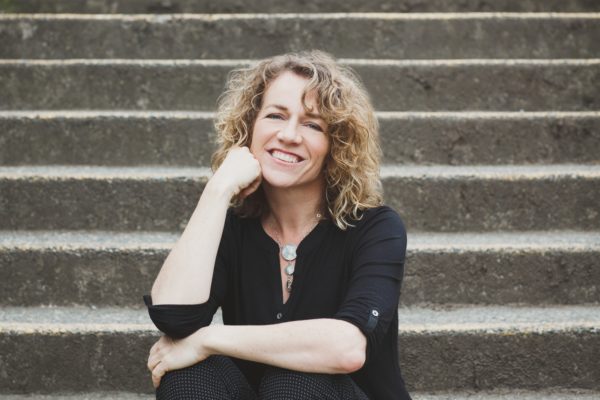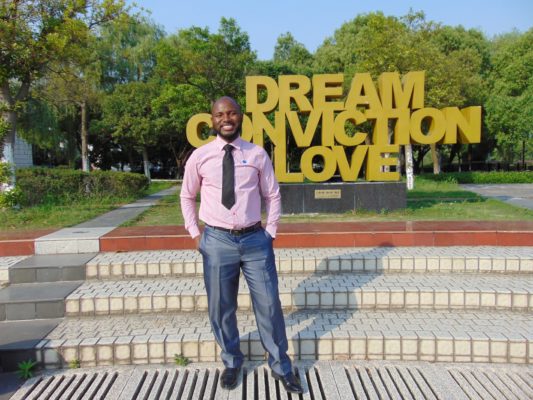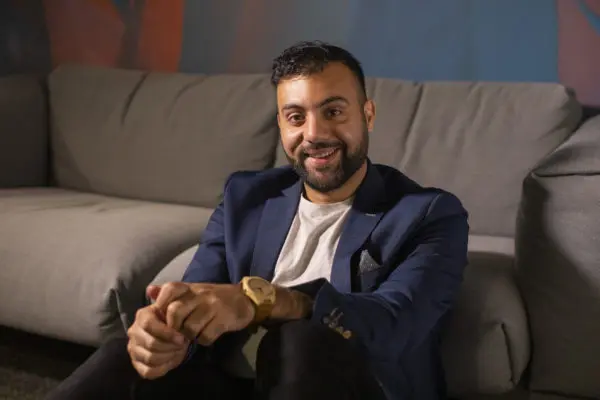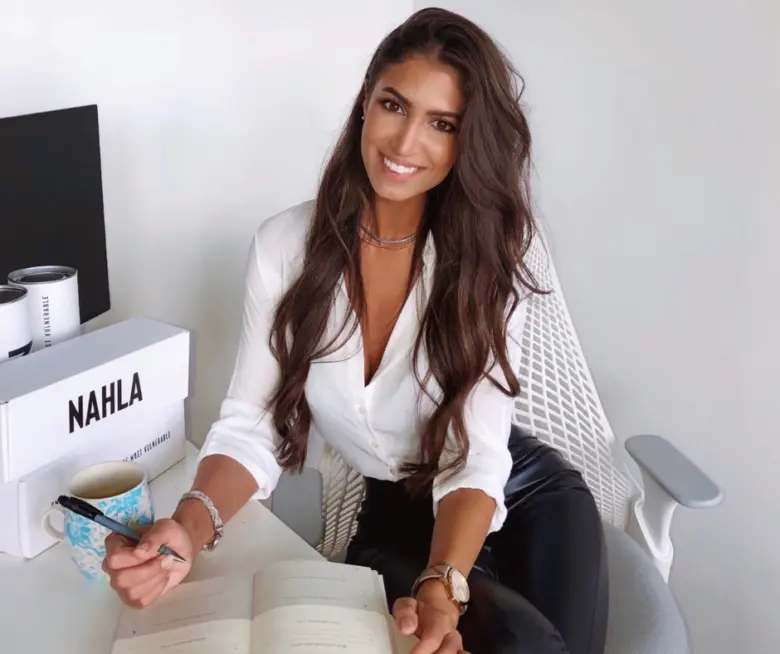
Founder of Nahla, Amani Abouchahine. © Courtesy of Amani Abouchahine
Living in Lebanon after the country was left shook by a civil war, Amani Abouchahine will never forget the destruction her family witnessed and experienced. Now a business owner in Canada, Amani is working to give back to millions of people displaced worldwide.
The Lebanese-Canadian entrepreneur and humanitarian explains why it’s so important for her to say “#IAmAnAdvocate” for refugees.
Amani, can you tell us a bit about your background?
I was born in Lebanon, in a small mountain village east of the capital, Beirut. The year was 1992 and the brutal, 15-year civil war that left the country physically, economically, politically, and socially depleted had recently ended. It also left tens of thousands displaced, including my parents, who recall countless stories and memories of hiding in basements for weeks at a time while the haunting sounds of bombs went off outside, hearing the terrifying roars of planes overhead. They would divide and salvage minimal amounts of food, not knowing when they could get more. They told us chilling stories of relocating in the middle of the night after word of another invasion.
I spent the first five years of my life in Lebanon with my parents and older brother. My memories of that time are sparse although there are specific, visceral images, smells and feelings that remain extremely vivid. Most notably, the physical and emotional destruction that could be seen and felt.
But the heart-breaking aftermath of war also has a way of bringing out the resiliency in the human spirit in terms of fostering community, hope and the unequivocal ability to rise again against all odds. I remember having a strong and unwavering desire to make an impact on the world. I didn’t know it at the time but knowing human suffering at a young age really gave me a unique perspective and an elevated level of empathy I want to use to give back.
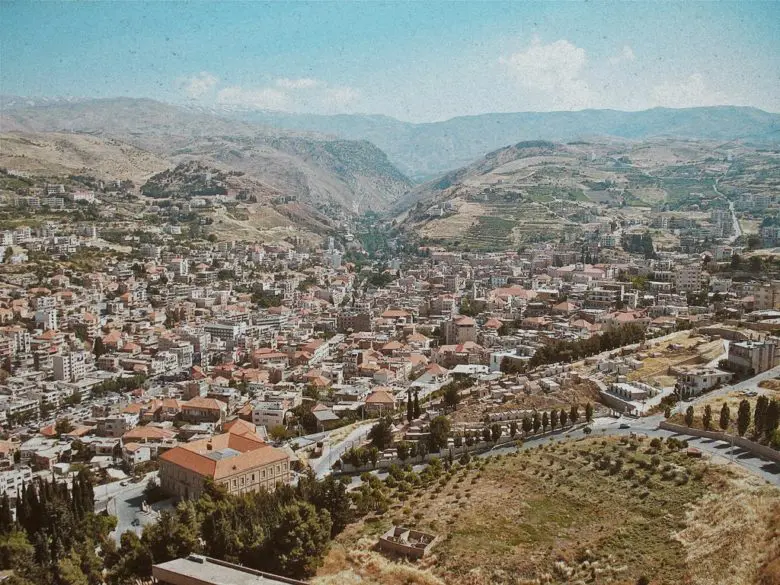
A photo of Amani’s home village in Lebanon. © Courtesy of Amani Abouchahine
In 1997, our family immigrated to Canada. The older I get, the more I can truly appreciate the countless selfless sacrifices, set-backs and challenges that my parents overcame to restart and rebuild in a new country, with two young children, with no other family around, barely speaking the language. The level of bravery they embodied continues to be my biggest inspiration.
It is those stories and memories that inspired me to start Nahla, a swim label that supports the most vulnerable humanitarian causes by partnering with global philanthropic organizations. Perhaps unsurprisingly, for Nahla’s first collection, I chose to partner with UNHCR, where 100 per cent of accessory profits will go directly to programs supporting stateless, forcibly displaced refugees around the world.
What inspires you to act and advocate for refugees?
Seeing the needs of refugees first-hand and being familiar with the multi-faceted work of the UNHCR made them an easy choice for our first partnership.
Lebanon currently has 1.5 million refugees and the need is greater than ever. I have been able to go back and visit a few times and have seen the presence of the UNHCR in the country and how their dynamic on-the-ground response truly changes lives.
Having said that, I am also very aware of the worldwide need. There are countries in the world in a state of emergency and it was important to me that funds were not only directed to Lebanon or the Middle East but could be used where they were deemed most necessary.
I also wanted to bring these humanitarian issues to millennials. Using a predominately social media-focused strategy and mega-influencers to advocate and raise awareness is a way to reach millennials on the platforms they use most. More than ever, these demographics have proven to care about ethical, social and humanitarian issues. My goal is to raise awareness in a way that speaks to millennials by being easily digestible and aligned with how they already consume information online.
To do this, our first collection aims to raise funds and awareness about the most pressing refugee emergencies. We have created two co-branded bandana scarves, where all of the profits will be donated directly to UNHCR. The first scarf was designed by Anas Albraehe, a Syrian refugee artist, currently residing in Lebanon. The abstract floral design embodies hope, freedom, and growth. The second design really embodies the partnership between Nahla and UNHCR, with both logos and slogans, “Saving Lives. Protecting Rights” and “Supporting The Most Vulnerable” appearing in repeating patterns on a muted mauve backdrop. We are excited to bring fashion and philanthropy together and use our first collection to benefit the incredible work of the UNHCR. You can shop the pieces at www.nahlaswim.shop and follow us on Instagram @nahla.swim.

Lexi Wood wearing the UNHCR scarf. © Courtesy of Nahla
As a refugee advocate, what support, community and help do you think is integral for those who are resettling in Canada?
I think that supporting and being an ally to refugees begins with a perspective shift. Recognizing their humanity and having a baseline level of empathy for their challenges is the first step. I also know how isolating and lonely the experience can be, so having resources relating to integration and fostering community goes such a long way. More tangibly, language classes, education and helping with job placements are also all things that can help set up families for long-term success.
I think that supporting and being an ally to refugees begins with a perspective shift. Recognizing their humanity and having a baseline level of empathy for their challenges is the first step.
Canada has a strong history of supporting refugees. What is the importance of bringing refugees issues to the forefront of the conversation, in Canada and worldwide?
I believe that how we care for the most vulnerable in our communities really defines who we are. It is also important to remember the spirit and inherent value refugees add to a community. Their background, their need for community, and their resiliency makes them able to add so much value to the culture of their new homes.
This year, UNHCR is celebrating its 70th anniversary. For the past seven decades, the UN Refugee Agency has been helping and supporting refugees and other displaced people. But in 2020, more than 79 million people remain displaced around the world. When you hear these statistics about the scale of the refugee emergency, how do you feel?
The numbers and gravity can feel very daunting but I also think it is important to remember that each of us has power to make a positive impact.
Whether that is being an advocate for refugees in your own community, contributing monetarily when you can, or helping to raise awareness in your own social spheres; it all compiles and makes a difference.
Add your name to the #IAmAnAdvocate pledge and join the UNHCR in sending send a clear message: everyone counts, and there is no place for xenophobia and racism in our world.



